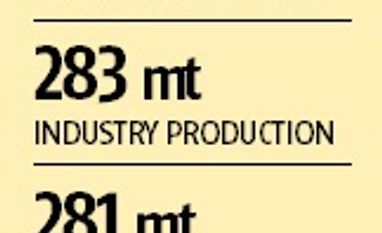After securing its place in the consumer goods and healthcare space, Emami Ltd has made a daring move into the cement industry, a territory unknown to the firm. The group’s experience so far has been in a vertical where the consumers and the users were one and the same set. That market is ruled by product positioning, perception and pricing, though not necessarily in that order. But the cement sector is a completely different playing field — users and consumers may not be the same set and pricing decision overrides product positioning.
Nonetheless, the opportunity is immense. With nearly 390 million tonnes (MT) of cement production capacity, India is the second largest cement producer in the world and accounts for 6.7 per cent of world’s cement output, according to an IBEF report. But Emami’s lack of prior experience in the field is making analysts sceptical. Citing examples of Reliance Infrastructure and Jaypee Group, analysts say companies with no experience in this sector have met with limited success. But the directors at Emami Ltd, Aditya Agarwal and Manish Goenka, sons of the group’s founders — R S Agarwal and Mr R S Goenka — who are investing in this venture in their individual capacities, are undeterred. The near-term mission for Double Bull, the cement brand, is best summed up by Agarwal: “We are here not to grow the category but to take market share”. The priority of the firm is to establish its business first through a network of distribution channels that can push the product to the consumer.
The advantage that Emami Cement enjoys is the brand name ‘Emami’. Goenka feels consumers and the cement dealers will be able to connect strongly with a brand they have either used or heard over a many decades. Emami Ltd with a Rs 21,200 crore market capitalisation and 2,900 direct distributors who cover every town in India with a population of over 20,000, is a name consumers are familiar with since 1974, albeit for its FMCG business.
The promoters feel that the group’s FMCG experience can be replicated in the cement space. “We understand consumer sentiment as we have been in the FMCG space for long. We can replicate the same for the new venture”, Goenka said hinting that the group’s experience in setting up a distribution network for edible oil from scratch will come in handy.
The company is going to appoint 250 dealers in Chhattisgarh, 250 in West Bengal and another 200 in Odisha. In the second phase of expansion, another set of 200 dealers will sell Double Bull in Bihar and Jharkhand; in the final leg another 200 dealers will be appointed in Maharashtra and Madhya Pradesh.
Emami Cement has already done a go-to-market research with McKinsey which has come up with city-wise plans on how to get the maximum out of its investment. The main push, right now, will be in Chhattisgarh where the company’s plant is located. Analysts, however, caution that the state is a saturated market, with a plethora of brands vying for consumer attention.
The mainstay of Emami’s marketing plan would be the ‘Nipurn’ programme which the company has charted out to engage masons directly. “Masons play a key part in this industry. Any remark against a brand to the consumer may not only dent reputation of a brand but will also result in losing a customer permanently. Thus we need to have an emotional connect with the masons,” Agarwal says.
More From This Section
To build its reputation as a reliable and responsible brand, Emami Cement’s strategy will involve insurance schemes, training and safety modules and education programmes for the masons’ children. Initially, around 8,000-10,000 masons will be enrolled for this. It’s only after establishing the dealer and mason network, that the firm will unveil full-scale branding and promotional activities — most likely by the end of January next year.
“We understand consumer sentiment as we have been in the FMCG space for long. We can replicate that succcess in the new venture”, said Manish Goenka Director, Emami Ltd
That said, Emami will be a late entrant in the Indian cement market, which is dominated by a handful of companies. The top 20 cement companies account for almost 70 per cent of the total cement production of the country. A total of 188 large cement plants together account for 97 per cent of the total installed capacity in the country, with 365 small plants account for the rest. Of these large cement plants, 77 are located in the states of Andhra Pradesh, Rajasthan and Tamil Nadu.
A second risk for the company is when it commences operations in Rajasthan and Andhra Pradesh. An analyst with Motilal Oswal said, that the cost of procurement of limestone mines has been done at a cost higher than market which may stress the balance sheet in the long run. Emami has bagged three limestone mines, one each in Chhattisgarh, Rajasthan and Andhra Pradesh. Only Chhattisgarh is operational.
The Indian cement market at a glance
The key to success would depend on keeping input costs — such as power and fuel — under control. That achieved, cement could be another success story for the Rs 10,000-crore Kolkata headquartered -company.
)